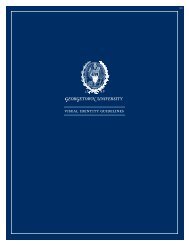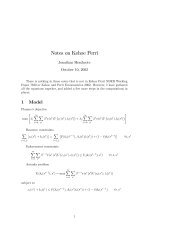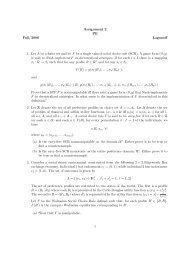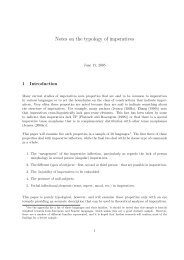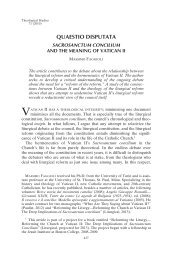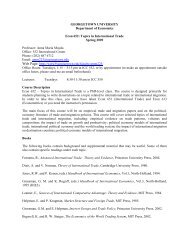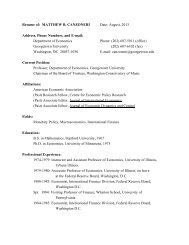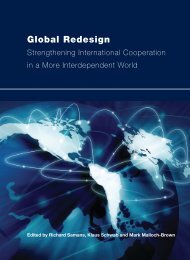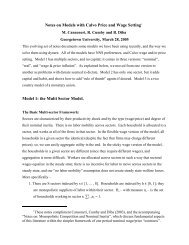Islam and the West: Annual Report on the State of Dialogue
Islam and the West: Annual Report on the State of Dialogue
Islam and the West: Annual Report on the State of Dialogue
You also want an ePaper? Increase the reach of your titles
YUMPU automatically turns print PDFs into web optimized ePapers that Google loves.
<str<strong>on</strong>g>Islam</str<strong>on</strong>g> <str<strong>on</strong>g>and</str<strong>on</strong>g> <str<strong>on</strong>g>the</str<strong>on</strong>g> <str<strong>on</strong>g>West</str<strong>on</strong>g>: <str<strong>on</strong>g>Annual</str<strong>on</strong>g> <str<strong>on</strong>g>Report</str<strong>on</strong>g> <strong>on</strong> <str<strong>on</strong>g>the</str<strong>on</strong>g> <strong>State</strong> <strong>of</strong> <strong>Dialogue</strong><br />
96<br />
Ec<strong>on</strong>omic <str<strong>on</strong>g>and</str<strong>on</strong>g> Social Development<br />
Box 7.4<br />
Who Speaks for Women in <str<strong>on</strong>g>the</str<strong>on</strong>g> Muslim-<str<strong>on</strong>g>West</str<strong>on</strong>g> <strong>Dialogue</strong> ?<br />
Ingrid Matts<strong>on</strong><br />
Ingrid Matts<strong>on</strong> is Pr<strong>of</strong>essor <strong>of</strong> <str<strong>on</strong>g>Islam</str<strong>on</strong>g>ic Studies <str<strong>on</strong>g>and</str<strong>on</strong>g> Christian-Muslim Relati<strong>on</strong>s <str<strong>on</strong>g>and</str<strong>on</strong>g> Director <strong>of</strong> <str<strong>on</strong>g>the</str<strong>on</strong>g> <str<strong>on</strong>g>Islam</str<strong>on</strong>g>ic<br />
Chaplaincy Program at <str<strong>on</strong>g>the</str<strong>on</strong>g> Hartford Seminary. In 2006 she was elected President <strong>of</strong> <str<strong>on</strong>g>the</str<strong>on</strong>g> <str<strong>on</strong>g>Islam</str<strong>on</strong>g>ic Society <strong>of</strong><br />
North America.<br />
Advocates <strong>of</strong> women’s rights in <str<strong>on</strong>g>the</str<strong>on</strong>g> <str<strong>on</strong>g>West</str<strong>on</strong>g>ern world have important roles to play in supporting Muslim women who are<br />
struggling for <str<strong>on</strong>g>the</str<strong>on</strong>g>ir rights. This support can be critical in societies where <str<strong>on</strong>g>the</str<strong>on</strong>g> rule <strong>of</strong> law, freedom <strong>of</strong> expressi<strong>on</strong> <str<strong>on</strong>g>and</str<strong>on</strong>g><br />
freedom <strong>of</strong> <str<strong>on</strong>g>the</str<strong>on</strong>g> press are limited or absent. <str<strong>on</strong>g>West</str<strong>on</strong>g>ern activists serve as translators or messengers for Muslim activists<br />
<str<strong>on</strong>g>and</str<strong>on</strong>g> can lobby <str<strong>on</strong>g>the</str<strong>on</strong>g>ir own governments to put pressure <strong>on</strong> repressive governments where Muslim women are struggling<br />
for <str<strong>on</strong>g>the</str<strong>on</strong>g>ir rights.<br />
Problems arise, however, when <str<strong>on</strong>g>West</str<strong>on</strong>g>ern activists act not as “h<strong>on</strong>est interpreters” for Muslim women, but ra<str<strong>on</strong>g>the</str<strong>on</strong>g>r reframe<br />
<str<strong>on</strong>g>the</str<strong>on</strong>g> message according to <str<strong>on</strong>g>the</str<strong>on</strong>g>ir own beliefs <str<strong>on</strong>g>and</str<strong>on</strong>g> in c<strong>on</strong>flict with <str<strong>on</strong>g>the</str<strong>on</strong>g> beliefs <strong>of</strong> <str<strong>on</strong>g>the</str<strong>on</strong>g> Muslim women for whom <str<strong>on</strong>g>the</str<strong>on</strong>g>y claim<br />
to be advocating.<br />
For example, when <str<strong>on</strong>g>the</str<strong>on</strong>g> Pakistani activist <str<strong>on</strong>g>and</str<strong>on</strong>g> gang-rape survivor Mukhtar Mai traveled in <str<strong>on</strong>g>the</str<strong>on</strong>g> United <strong>State</strong>s to speak<br />
about <str<strong>on</strong>g>the</str<strong>on</strong>g> violati<strong>on</strong> <strong>of</strong> her human rights, she emphasized that <str<strong>on</strong>g>the</str<strong>on</strong>g> sources <strong>of</strong> her oppressi<strong>on</strong> were illiteracy, government<br />
corrupti<strong>on</strong> <str<strong>on</strong>g>and</str<strong>on</strong>g> an ancient tribal caste system. Many <strong>of</strong> Mukhtar’s “advocates” kept framing her message as that <strong>of</strong> a<br />
woman oppressed by <str<strong>on</strong>g>Islam</str<strong>on</strong>g> or that <strong>of</strong> a citizen <strong>of</strong> a Muslim country, although Mukhtar rejected this interpretati<strong>on</strong> <strong>of</strong><br />
her situati<strong>on</strong>, highlighting instead <str<strong>on</strong>g>the</str<strong>on</strong>g> importance <strong>of</strong> <str<strong>on</strong>g>Islam</str<strong>on</strong>g> as her source <strong>of</strong> spiritual strength. Indeed, she pointed to<br />
<str<strong>on</strong>g>the</str<strong>on</strong>g> support <strong>of</strong> <str<strong>on</strong>g>the</str<strong>on</strong>g> local religious leader (mullah) as <str<strong>on</strong>g>the</str<strong>on</strong>g> reas<strong>on</strong> why her case succeeded.<br />
Similarly, problems arise when <str<strong>on</strong>g>West</str<strong>on</strong>g>ern activists insist that certain beliefs <str<strong>on</strong>g>and</str<strong>on</strong>g> practices that many Muslim women embrace<br />
are inherently oppressive. It is ir<strong>on</strong>ic that <str<strong>on</strong>g>West</str<strong>on</strong>g>ern women who claim to be interested in supporting <str<strong>on</strong>g>the</str<strong>on</strong>g>ir Muslim sisters<br />
are unaware <strong>of</strong> how deeply paternalistic <str<strong>on</strong>g>the</str<strong>on</strong>g>ir attitude is. This lack <strong>of</strong> self-awareness <strong>of</strong>ten arises because many women<br />
take what <str<strong>on</strong>g>the</str<strong>on</strong>g>y perceive to be oppressive practices or attitudes towards o<str<strong>on</strong>g>the</str<strong>on</strong>g>r women pers<strong>on</strong>ally.<br />
A<str<strong>on</strong>g>West</str<strong>on</strong>g>ernwomanwhoassumesthataheadscarfisasign<strong>of</strong><str<strong>on</strong>g>the</str<strong>on</strong>g>degradati<strong>on</strong><strong>of</strong>womenfeelswithinherselfanurgent<br />
desire to get that thing <strong>of</strong>f <str<strong>on</strong>g>the</str<strong>on</strong>g> o<str<strong>on</strong>g>the</str<strong>on</strong>g>r woman’s head. Until that happens, she remains <strong>of</strong>fended <str<strong>on</strong>g>and</str<strong>on</strong>g> anxious, <str<strong>on</strong>g>and</str<strong>on</strong>g> <strong>of</strong>ten<br />
deaf to <str<strong>on</strong>g>the</str<strong>on</strong>g> o<str<strong>on</strong>g>the</str<strong>on</strong>g>r woman’s own interpretati<strong>on</strong> <str<strong>on</strong>g>and</str<strong>on</strong>g> underst<str<strong>on</strong>g>and</str<strong>on</strong>g>ing <strong>of</strong> her beliefs <str<strong>on</strong>g>and</str<strong>on</strong>g> practices.<br />
C<strong>on</strong>versati<strong>on</strong>s about women’s rights across <str<strong>on</strong>g>West</str<strong>on</strong>g>ern <str<strong>on</strong>g>and</str<strong>on</strong>g> <str<strong>on</strong>g>Islam</str<strong>on</strong>g>ic communities are <strong>of</strong>ten unproductive because women<br />
in <str<strong>on</strong>g>West</str<strong>on</strong>g>ern countries tend to focus <strong>on</strong> oppressi<strong>on</strong> that <str<strong>on</strong>g>the</str<strong>on</strong>g>y see as gender-specific, whereas women in <str<strong>on</strong>g>Islam</str<strong>on</strong>g>ic communities<br />
focus instead <strong>on</strong> different forms <strong>of</strong> oppressi<strong>on</strong> that <str<strong>on</strong>g>the</str<strong>on</strong>g>y see as more urgent – at least when <str<strong>on</strong>g>the</str<strong>on</strong>g>y meet with a group <strong>of</strong><br />
<str<strong>on</strong>g>West</str<strong>on</strong>g>erners.<br />
If feminism is about embracing <str<strong>on</strong>g>the</str<strong>on</strong>g> full human identify <strong>of</strong> women, <str<strong>on</strong>g>the</str<strong>on</strong>g>n women’s rights advocates need to hear Muslim<br />
women's full spectrum <strong>of</strong> c<strong>on</strong>cerns, including <str<strong>on</strong>g>the</str<strong>on</strong>g>ir percepti<strong>on</strong>s <strong>of</strong> political, military <str<strong>on</strong>g>and</str<strong>on</strong>g> ec<strong>on</strong>omic oppressi<strong>on</strong>.<br />
Many <str<strong>on</strong>g>West</str<strong>on</strong>g>erners approach <str<strong>on</strong>g>the</str<strong>on</strong>g> issue <strong>of</strong> Muslim women’s rights assuming gender solidarity am<strong>on</strong>g women. Many Muslim<br />
women feel that this solidarity will remain superficial until <str<strong>on</strong>g>West</str<strong>on</strong>g>ern women can address <str<strong>on</strong>g>the</str<strong>on</strong>g> ways <str<strong>on</strong>g>the</str<strong>on</strong>g>ir own ec<strong>on</strong>omic<br />
<str<strong>on</strong>g>and</str<strong>on</strong>g> political activities are sources <strong>of</strong> oppressi<strong>on</strong> for many Muslim women.



